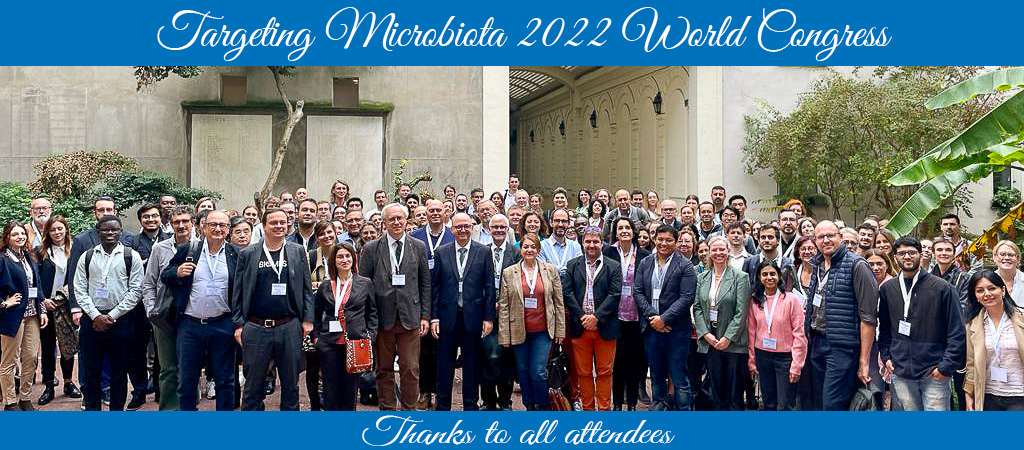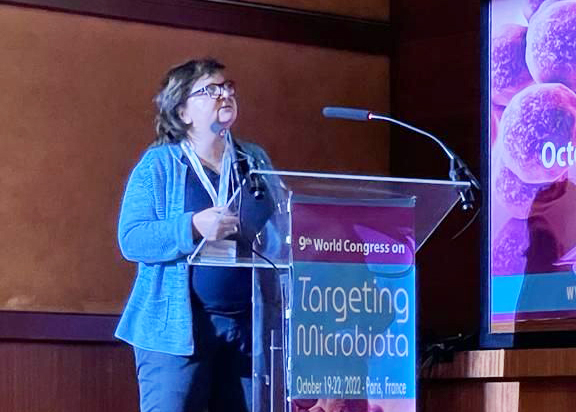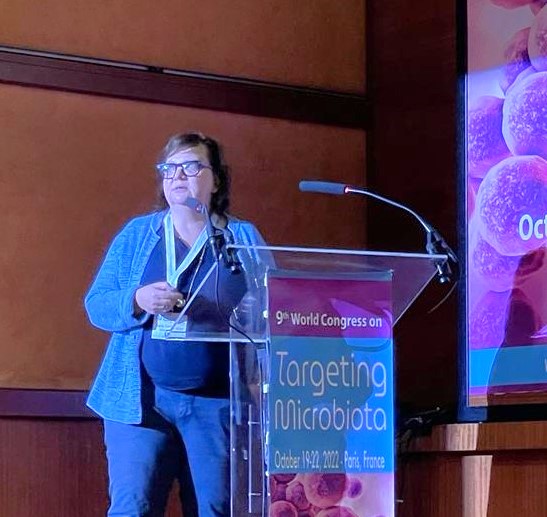Alerts
Multi-omics in Colon Cancer and Role of the Microbiome
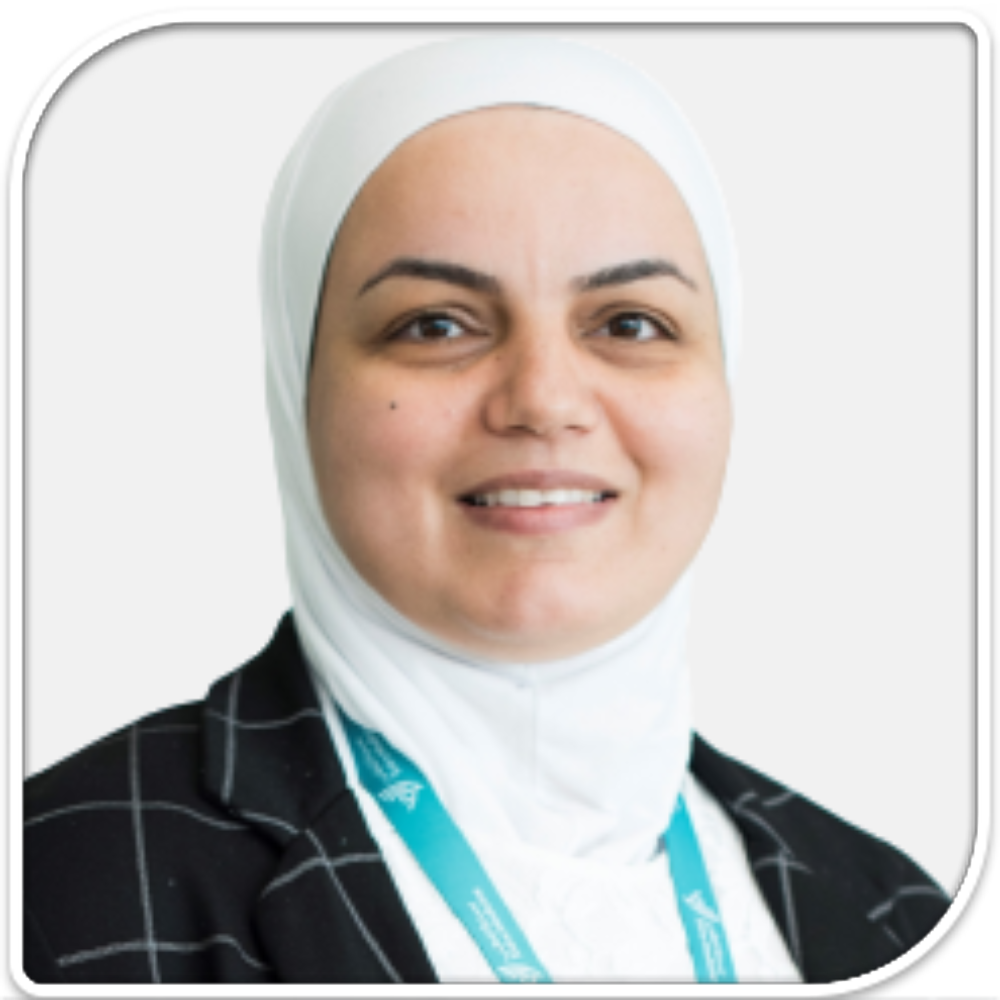 Dr. Souhaila Al Khodor from Sidra Medicine, Qatar will join the Targeting Microbiota 2023 congress to talk about: "Multi-omics in Colon Cancer and Role of the Microbiome".
Dr. Souhaila Al Khodor from Sidra Medicine, Qatar will join the Targeting Microbiota 2023 congress to talk about: "Multi-omics in Colon Cancer and Role of the Microbiome".
This study consisted of 348 treatment-naïve patients with colon cancer that were profiled using various omics including 16S rRNA gene sequencing and complemented with tumor whole-genome sequencing for further microbiome analysis. Dr. Al Khodor and her team characterized the immune-microbiota interactions in those patients and identified microbial signatures predictive of overall survival.
They identified a microbiome signature, driven by Ruminococcus bromii, that was associated with a favorable outcome. This study is a step forward toward implementing microbiota-targeting approaches, such as dietary intervention in the adjuvant or neoadjuvant setting.
Join Targeting Microbiota 2023 to learn more about Dr. Khodor's talk.
You can share your related work by submitting your abstract.
Targeting Microbiota 2023 Congress
October 17-19, 2023 - Venice
Linkedin | Facebook | Website
Clinical Applications of Gut Microbiota: Gut Microbiome for Prediction of Colorectal Neoplasia
 Dr. Francis K L Chan from The Chinese University of Hong Kong, China will join the Targeting Microbiota 2023 congress and will give a speech entitled "Clinical Applications of Gut Microbiota: Gut Microbiome for Prediction of Colorectal Neoplasia".
Dr. Francis K L Chan from The Chinese University of Hong Kong, China will join the Targeting Microbiota 2023 congress and will give a speech entitled "Clinical Applications of Gut Microbiota: Gut Microbiome for Prediction of Colorectal Neoplasia".
Join us in Targeting Microbiota 2023 and benefit from the experience of Dr. Chan. Don't forget that you can share your related work by submitting your abstract.
Targeting Microbiota 2023 Congress
October 17-19, 2023 - Venice
Linkedin | Facebook | Website
Anthropology and Research on the Microbiome: Addressing Future Health
 Prof. Roberta Raffaetà from Università Ca' Foscari Venezia, Italy will join the Targeting Microbiota 2023 congress and will give a presentation entitled "Anthropology and Research on the Microbiome: Addressing Future Health".
Prof. Roberta Raffaetà from Università Ca' Foscari Venezia, Italy will join the Targeting Microbiota 2023 congress and will give a presentation entitled "Anthropology and Research on the Microbiome: Addressing Future Health".
Prof. Raffaetà's talk will introduce the socio-anthropological debate and research on the microbiome and its implications for future health. It will particularly focus on the ERC HealthXCross project. This is a multi-sited, comparative ethnographic study of how technoscience is reconfiguring practices and ideas of health in ecological perspective.
Join us in Targeting Microbiota 2023 and benefit from the experience of Prof. Raffaetà. Don't forget that you can share your related work by submitting your abstract.
Targeting Microbiota 2023 Congress
October 17-19, 2023 - Venice
Linkedin | Facebook | Website
Fecal Gut Microbiota and Metabolite Signatures as Biomarkers for Gastrointestinal Disorders
 The organizing committee of the Targeting Microbiota 2023 congress, is honored to announce the participation of Prof. Lena Öhman from the University of Gothenburg, Sweden.
The organizing committee of the Targeting Microbiota 2023 congress, is honored to announce the participation of Prof. Lena Öhman from the University of Gothenburg, Sweden.
Prof. Öhman will give a major speech on "Fecal Gut Microbiota and Metabolite Signatures as Biomarkers for Gastrointestinal Disorders".
There is an urgent need to develop biomarkers for patients with gastrointestinal disorders. The talk will address the potential of fecal gut microbiota and metabolite signatures as biomarkers for inflammatory bowel disease and irritable bowel syndrome.
Join us in Targeting Microbiota 2023 and benefit from the experience of Prof. Öhman. Don't forget that you can share your related work by submitting your abstract.
Targeting Microbiota 2023 Congress
October 17-19, 2023 - Venice
Linkedin | Facebook | Website
Gut Microbiota and Cancer Immunotherapy
 Dr. Andrew Y. Koh from the University of Texas Southwestern Medical Center, USA will join the Targeting Microbiota 2023 congress and will give a speech entitled "Gut Microbiota and Cancer Immunotherapy".
Dr. Andrew Y. Koh from the University of Texas Southwestern Medical Center, USA will join the Targeting Microbiota 2023 congress and will give a speech entitled "Gut Microbiota and Cancer Immunotherapy".
Gut microbiota, specifically gut bacteria, are critical for effective immune checkpoint blockade therapy (ICT) for cancer. The mechanisms by which gut microbiota augment extraintestinal anticancer immune responses, however, are largely unknown. Dr. Koh and his team find that ICT induces the translocation of specific endogenous gut bacteria into secondary lymphoid organs and subcutaneous melanoma tumors.
Mechanistically, ICT induces lymph node remodeling and dendritic cell (DC) activation, which facilitates the translocation of a selective subset of gut bacteria to extraintestinal tissues to promote optimal antitumor T cell responses in both the tumor-draining lymph nodes (TDLNs) and the primary tumor. Antibiotic treatment results in decreased gut microbiota translocation into mesenteric lymph nodes (MLNs) and TDLNs, diminished DC and effector CD8+ T cell responses, and attenuated responses to ICT.
Those findings illuminate a key mechanism by which gut microbiota promote extraintestinal anticancer immunity
Join us in Targeting Microbiota 2023 and benefit from the experience of Dr. Koh. Don't forget that you can share your related work by submitting your abstract.
Targeting Microbiota 2023 Congress
October 17-19, 2023 - Venice
Linkedin | Facebook | Website
The University of Padova is Locally Involved in Organizing Targeting Microbiota 2023

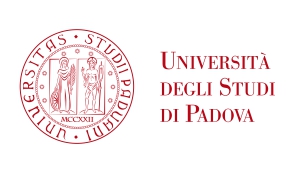
Prof. Maria Cecilia Giron from the University of Padova will be locally organizing The 10th World Congress on Targeting Microbiota 2023 in Venice on October 17-19.
The International Society of Microbiota look forward to meeting you in Venice for a conference that will target microbiota to unravel the future of medicine.
You can learn more about the Targeting Microbiota 2023 event organization in this press release.
Sessions of Targeting Microbiota 2023.
Targeting Microbiota 2023 Congress
October 17-19, 2023
Website | LinkedIn | Facebook
Targeting Microbiota 2023 will be held at Isola di San Servolo, Venice, Italy
The 10th World Congress on Targeting Microbiota 2023 will be held on October 17-19 at
Isola di San Servolo - Centro Soggiorno
Isola di San Servolo, 30124 Venice, Italy

Visit San Servolo Island's official website.
More about San Servolo Island
The island of San Servolo, immersed in the lagoon between San Giorgio and the Lido, houses in its rectangle of land a vast architectural complex and a beautiful park. Upon landing, you are immediately dominated by the giant spherical sculpture by Arnaldo Pomodoro, but in just a few steps everything disappears and you find yourself immersed in greenery, lost in silence and enchanted by the view of the lagoon and the care of the vegetation.
San Servolo is often selected to be used as an exhibition space and special events, such as the recurring More Festival, a great festival organized by France. The more experimental wing of the Academy of Fine Arts is also housed insidededicated to new technologies. A beautiful evolution for a place that has historically undergone a multitude of functions: from a spiritual refuge for Benedictine monks at the end of the 9th century, evidenced by the construction of a small church, up to a psychiatric hospital (if you can call it that in the 1700s), the main up to the law of Franco Basiglia to whose name the Foundation based in San Servolo is dedicated.
How to reach the island
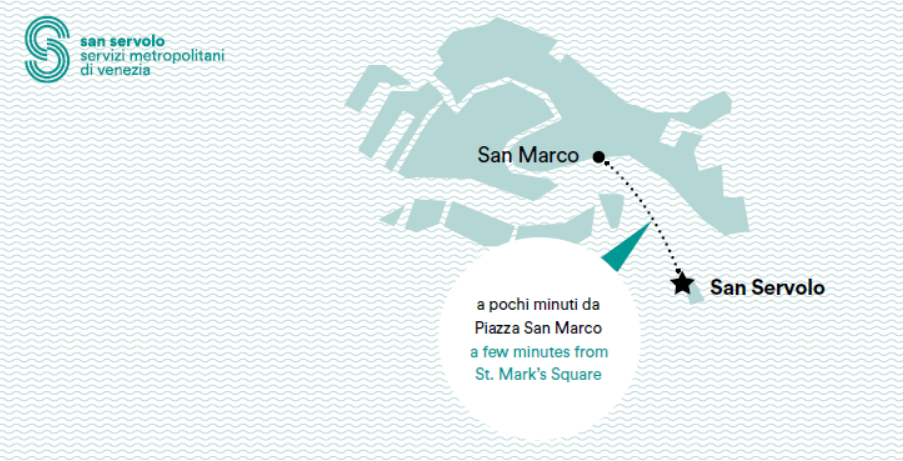
Reaching San Servolo by Vaporetto
San Servolo can be reached in 8 to 10 minutes by vaporetto from St. Mark's square (Vaporetto stop: San Zaccaria – Pier B), Venice.
The vaporetto line is number 20. You can access the schedule here.
Reaching St. Mark's square to take the Vaporetto to San Servolo
You can reach St. Mark’s square from the airport :
- Either by boat with Alilaguna (orange line)
- Or by bus and vaporetto (you reach Piazzale Roma by bus and take a vaporetto for San Zaccaria)
More information about the transportation to San Servolo.
More information about the island's location.
Easy Access to Venice
As San Servolo Island is only a 10-minute vaporetto ride away, you can easliy and rapidly access Venice, one of the most famous cities of the world.
Every corner of Venice is a piece of History, an artwork, a place where to stand for a reflection about how great it was in the past.
Learn more about Venice tourism.
Book your Hotel
Many hotels are located near the island. Feel free to check and search for otels that are in the San Marco area.
ISM is now welcoming abstracts for Targeting Microbiota 2023
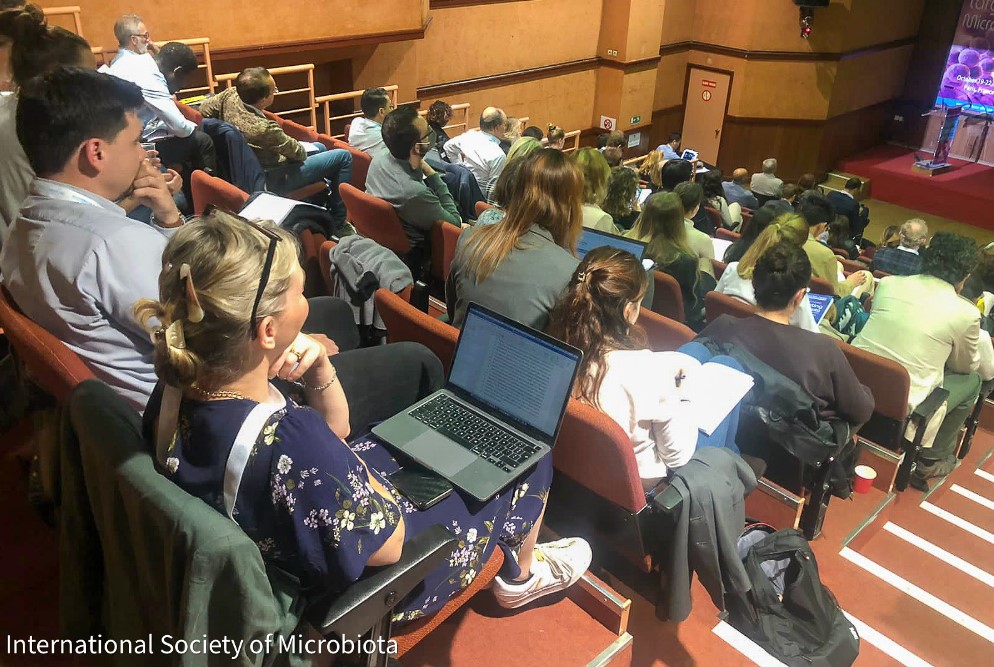
The 10th edition of the World Congress on Targeting Microbiota is being organized on October 2023.
Your latest research and innovations in the world of microbiota can now be considered for a short oral/ poster presentation during the conference. The abstract submission procedure is now activated.
The topics for this year include but are not limited to the following tracks.
Don't miss your chance to share your latest microbiota related research with international scientists!
Media contact:
International Society of Microbiota
[email protected]
Targeting Microbiota 2023 Congress
October 18-19, 2023
Website | Linked In | Facebook
Targeting Microbiota 2022 Captured Moments
Happy Holidays from the International Society of Microbiota. On behalf of the ISM organizing committee, we wish to share with you the captured moments of Targeting Microbiota 2022. All pictures of the 9th World Congress are now available.
Aside from reviewing the moments of this successful meeting that gathered more than 230 attendees worldwide, you can now demand access to the conference replay and 100+ abstracts.
Thanks to all attendees for their participation and scientific contributions to the vast microbiota world.
We wish to meet you all again next year and hear about your latest research and discoveries.
The International Society of Microbiota
Website | LinkedIn | Facebook
News Release, International Society of Microbiota, France – December 22, 2022
Prof. Maria Cecilia Giron Awarded for Her Scientific Contribution on Cancer Therapy and Microbiota
|
Prof. Giron presented a strategic talk on "Cancer Therapy and Microbiota" on which she was discerned the Best Scientific Contribution Award during Trageting Microbiota 2022. Prof. Maria Cecilia Giron gave an overview of the influence of gut microbiota on ensuring the efficacy and lowering the toxicity of current cancer therapies. She is Associate Professor of Pharmacology at the University of Padova where together with her team is focused in targeting the interaction between innate immunity, enteric nervous system and microbiome in diverse intestinal inflammatory pathologies (e.g., Irritable Bowel Syndrome (IBS), Inflammatory Bowel Diseases (IBD) and Inflammation-Associated Colorectal Cancers) as well as in gut neuropathies including Multiple Sclerosis and Parkinson’s Disease in order to develop new pharmacological treatments and/or nutritional strategies. Dr. Giron currently serves as pharmacologist in the Ethics Committee for Clinical Studies of the Padova University Hospital, in the Ethics Committee for Oncological Clinical Trials of the Veneto Institute of Oncology and in the Veneto Region Medicines Evaluation Committee. She is a pioneer in research on the role of gut microbiota and intestinal function in normal and pathological conditions. She is author of more than 60 peer-reviewed publications, and co-founder of Eubiome, an innovative University spin-off and start-up, involved in FMT research and therapeutic applications of gut microbiota in human and animal recipients. The International Society of Microbiota allows you to access the full conference on demand. Prof. Maria Cecilia Giron's Presentation |
Targeting Microbiota 2022 Congress
October 19-21, 2022- Paris, France
www.microbiota-site.com
Short Oral Presentation Award 2022: Recombinant Lactic Acid Bacteria for IBD Therapy
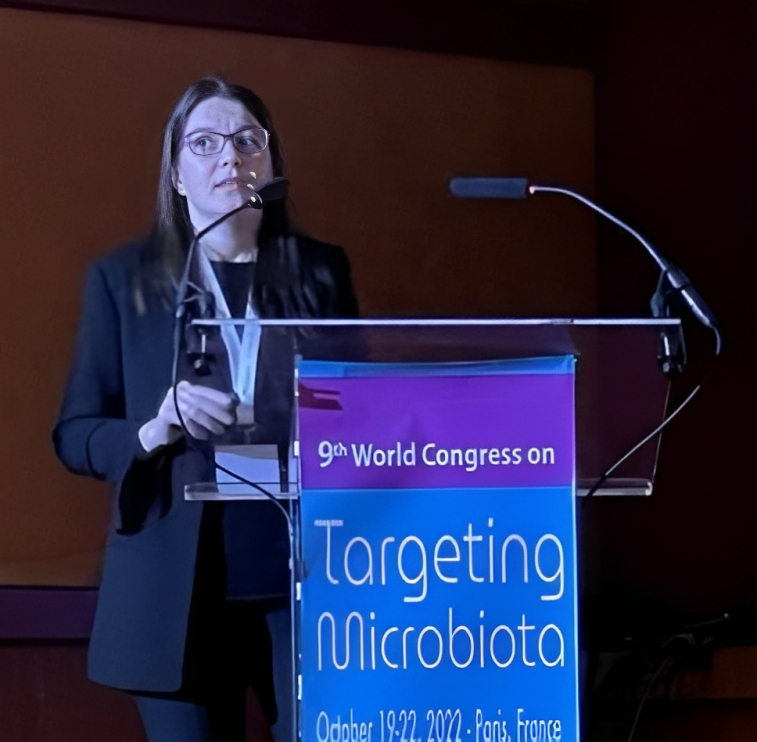
Abida Zahirović, Jozef Stefan Institute, Slovenia, was awarded during Targeting Microbiota 2022 for her talk on "Recombinant Lactic Acid Bacteria for Therapy of Inflammatory Bowel Disease".
Dr. Zahirović shared with the International Society of Microbiota that her future research will be focussed on development of targeted bacterial delivery systems for anticancer agents.
She state: "In my PostDoc project, I aim to engineer lactic acid bacteria to display cancer cell-specific ligand on their surface and concomitantly secrete cytotoxic protein to achieve selective killing of cancer cells. In vivo tumour-targeting bacteria can increase intratumoral accumulation of a cytotoxic protein, thus restricting its activity to the tumour and sparing healthy tissue from toxic side-effects."
The Scientific Committee congratulates Dr. Zahirović again for her exceptional talk and look forward to hearing the outcome of her research in future meetings.
Targeting Microbiota 2022 Congress
October 19-21, 2022- Paris, France
www.microbiota-site.com
Short Oral Presentation Award 2022: Effects of the Unique Metabolism of Blautia Wexlerae on Obesity & Diabetes
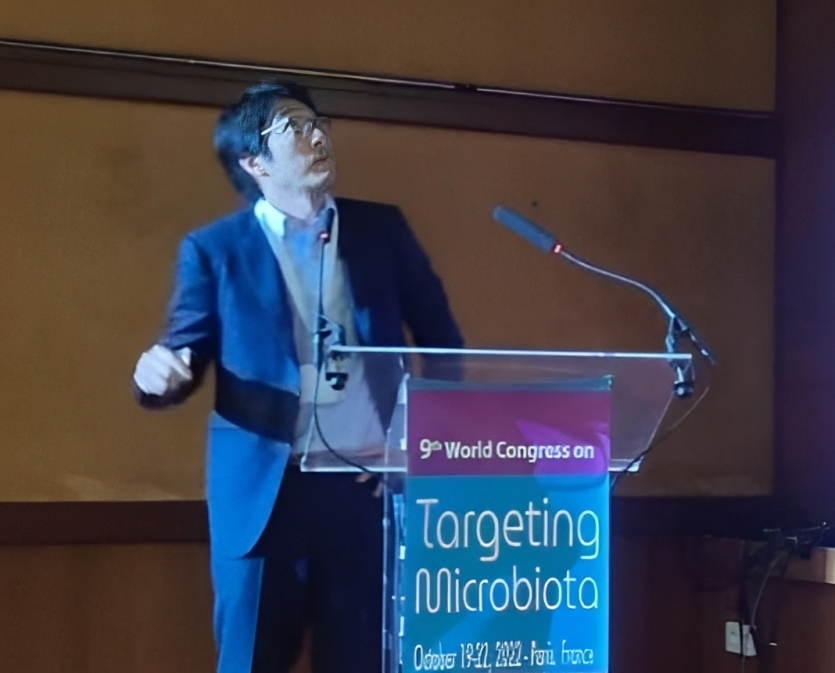
Koji Hosomi, National Institutes of Biomedical Innovation, Japan was discerned the Best Short Oral Presentation Award 2022 for his talk entitled "Unique Metabolism of Blautia Wexlerae Has Beneficial Effects on the Control of Obesity and Type 2 Diabetes".
Dr. Hosomi sincerely congratulated the scientific committee for the award. He stated: "With this award as encouragement, I continues to vigorously research on the relationship between the microbiota and health, and hope to create academic knowledge that can contribute to improving people's health and controlling diseases."
The International Society of Microbiota looks forward to be updates with Dr. Hosomi's future research and congratulates him again.
Targeting Microbiota 2022 Congress
October 19-21, 2022- Paris, France
www.microbiota-site.com
Dr. Gilbert Skorski From Phylogene was awarded on his Poster during Targeting Microbiota 2022
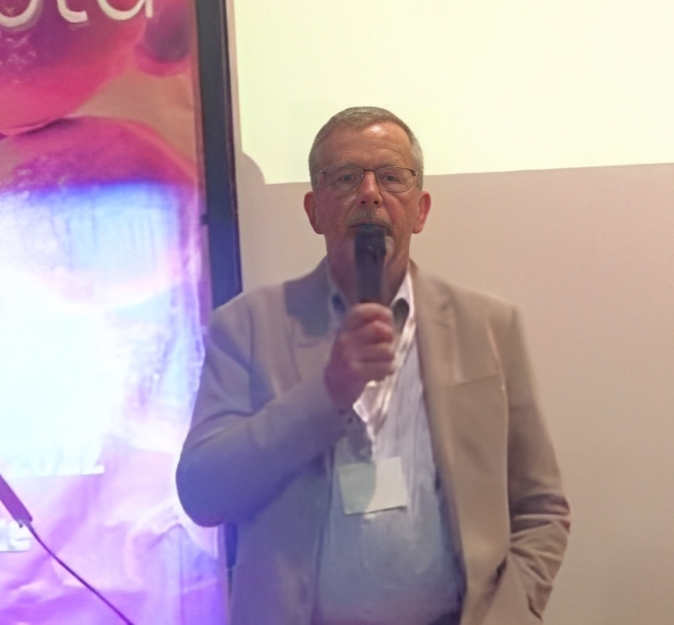
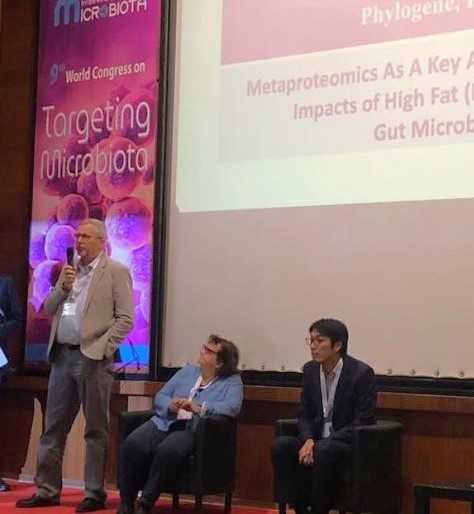
"Metaproteomics As A Key Approach To Identify Impacts of High Fat (HIF) Diet on the Gut Microbiome" by Dr. Gilbert Skorski, Phylogene, France.
This strategic poster was awarded during Targeting Microbiota 2022. Dr. Skorski stated that the microbiomes understanding progresses depend on the available analytical tools of the meta-omics disciplines. Among those, metaproteomics is the omics which is ideally positioned at the effective functional level , not potential level, which has the power of metagenomics with the proteogenomics approach, and which detects the host and microbiome proteins simultaneously in an untargeted way.
Dr. Skorski shared with the International Society of Microbiota abouit his future work: "For the next steps, PHYLOGENE team will go on developing the metaproteomics and dedicated bioinformatics tools, including in transomics approaches, to reveal the microbiomes functions impacted in diseases or disease treatment of gut, skin, eyes, bones and cartilages and others…"
Thanks to Dr. Skorski for sharing this exceptional poster. The scientific committee look forward to learning all about his next project in Phylogene.
Targeting Microbiota 2022 Congress
October 19-21, 2022- Paris, France
www.microbiota-site.com
FMT 2022: Reorganization and Perspective

Prof. Peter C. Konturek, President of ISM from Teaching Hospital of the University of Jena, Germany will present a talk entitled "FMT 2022: Reorganization and Perspective".
Prof. Konturek will present new data on FMT and include important remarks on the reorganization of fecal microbiota therapy due to the SARS Cov2 Pandemic.
Targeting Microbiota 2022 Congress
October 19-21, 2022- Paris, France
www.microbiota-site.com
Microbiota and Drug Metabolism: Towards a Personalized Medicine
 Dr. Cristina Giaroni from University of Insubria, Italy will be joining us this October to moderate a session entitled "Microbiota and Drug Metabolism: Towards a Personalized Medicine".
Dr. Cristina Giaroni from University of Insubria, Italy will be joining us this October to moderate a session entitled "Microbiota and Drug Metabolism: Towards a Personalized Medicine".
The gut microbiota plays a pivotal role in human health by modulating gut epithelial and immune cell functions, preventing pathogen colonization, and providing essential nutrients and bioactive metabolites. From a metabolic standpoint, gut microbes actively participate to drug metabolism, influencing drug disposition, half-life, and efficacy. Gut bacteria are not only a major source for local drug metabolism but can also indirectly affect xenobiotic stability by modulating host-mediated metabolic clearance as well as by competition of bacterial-derived metabolites for host drug metabolic pathways.
In view of the existing bidirectional drug-microbiota relationship, drugs themselves can influence the composition and function of the gut microbiota. In this context, alterations of the gut microbiota homeostasis after broad spectrum antibiotic administration does not only deprive the host from essential bacterial metabolites but may also profoundly alter drug metabolic pathways. A further critical issue is the development of antibiotic resistance in some species of bacteria. The human gut is considered the main reservoir of antibiotic resistance genes. Antibiotic treatment may rapidly increase the pool of resistance genes, favouring the formation of a biofilm rich of microorganisms resistant against several antibiotics thus contributing to reduce host defence and hampering the efficacy of treatments for bacterial infections.
Overall, these considerations open a new avenue for a research aiming at evaluating the relevance of drug-gut microbiota interplay in the variation of individual responses to disease treatment, thus opening the possibility for more personalized therapeutic approaches.
Join us in Targeting Microbiota 2022 and benefit from the experience of Dr. Giaroni. Don't forget that you can share you work in this session by submitting your abstract.
Targeting Microbiota 2022 Congress
October 19-21, 2022 - Paris, France
www.microbiota-site.com
May the Microbiota of the long-lived Naked Mole-rat Affect Human Health?

Porf. Gerd Birkenmeier from University of Leipzig, Germany will join the Targeting Microbiota 2022 Congress and give a presentation entitled "May the Microbiota of the long-lived Naked Mole-rat Affect Human Health?.
Join Prof. Birkenmeier in Targeting Microbiota 2022 to benefit from his experience on the host - microbiota interactions.
Targeting Microbiota 2022 Congress
October 19-21, 2022 - Paris, France
www.microbiota-site.com
Fecal Microbiota Transplantation as an Immunomodulatory and Anti-Infective Agent
 Dr. Jarosław Biliński, from Medical University of Warsaw, Poland will join the Targeting Microbiota 2022 Congress and give a presentation entitled "Fecal Microbiota Transplantation as an Immunomodulatory and Anti-Infective Agent".
Dr. Jarosław Biliński, from Medical University of Warsaw, Poland will join the Targeting Microbiota 2022 Congress and give a presentation entitled "Fecal Microbiota Transplantation as an Immunomodulatory and Anti-Infective Agent".
There is mounting evidence that the gut microbiome directly influences immune responses, especially in patients with hematological malignancies undergoing hematopoietic cell transplantation. Recent studies show that fecal microbiota transplantation could decrease the number of infectious complications, decolonize the gut from antibiotic-resistant bacteria and even treat immune complications like graft-versus-host disease. More attention is paid to the prophylactic use of microbiota modulation in most affected patients, which could revolutionize current practices.
Join Dr. Biliński in Targeting Microbiota 2022 to benefit from his experience and better understand microbiota immunotherapy.
Targeting Microbiota 2022 Congress
October 19-21, 2022 - Paris, France
www.microbiota-site.com
Gene Editing and Microbiome Therapy
 Prof. Nahla Mansour, National Research Center, Egypt, will be joining us this October to discuss her latest findings on "Gene Editing and Microbiome Therapy".
Prof. Nahla Mansour, National Research Center, Egypt, will be joining us this October to discuss her latest findings on "Gene Editing and Microbiome Therapy".
Gene editing holds a promising future in microbiome therapy and exploring the complex interplay between members of the microbiome and our bodies.
In this presentation, Dr. Mansour will highlight the re-emerging of gene editing tools and multiple strategies in microbiome therapy past, present, and future.
She will show her previous work describing the genetically engineered probiotic strains that have been constructed by our group and also our new project using CRISPR- Cas tools.
A whole session will be dedicated to the Strategies, Innovations & Challenges to Target Microbiota Dysbiosis.
Targeting Microbiota 2022 Congress
October 19-21, 2022 - Paris, France
www.microbiota-site.com
Cancer therapy and Microbiota
 Dr. Maria Cecilia Giron, from University of Padova, Italy will join the Targeting Microbiota 2022 Congress and give a presentation entitled "Cancer therapy and Microbiota".
Dr. Maria Cecilia Giron, from University of Padova, Italy will join the Targeting Microbiota 2022 Congress and give a presentation entitled "Cancer therapy and Microbiota".
Join Dr. Giron in Targeting Microbiota 2022 to benefit from his experience and better understand the role of microbiota in arterial thrombosis.
Targeting Microbiota 2022 Congress
October 19-21, 2022 - Paris, France
www.microbiota-site.com
Interactions of Skin Microbiota with Chosen Plant Extracts and Natural Products
 Dr. Sebastian Granica, Medical University of Warsaw, Poland, will be joining the 9th ISM Annual Meeting to discuss the "Interactions of Skin Microbiota with Chosen Plant Extracts and Natural Products".
Dr. Sebastian Granica, Medical University of Warsaw, Poland, will be joining the 9th ISM Annual Meeting to discuss the "Interactions of Skin Microbiota with Chosen Plant Extracts and Natural Products".
Join Targeting Microbiota 2022 to lear more about the skin microbiota. Secure a place.
Targeting Microbiota 2022 Congress
October 19-21, 2022 - Paris, France
www.microbiota-site.com
Gut Microbiome and Retinal Disorders: Recent Advances and Perspectives
 Dr. Dimitra Skondra, University of Chicago, USA, will be joining the 9th ISM Annual Meeting to discuss "Gut Microbiome and Retinal Disorders: Recent Advances and Perspectives".
Dr. Dimitra Skondra, University of Chicago, USA, will be joining the 9th ISM Annual Meeting to discuss "Gut Microbiome and Retinal Disorders: Recent Advances and Perspectives".
Recent work demonstrates important role of gut microbiome and retinal diseases such as age-related macular degeneration and retinopathy of prematurity. Emerging evidence for the existence and pathways of gut-retina axis can elucidate previously unknown pathways involved in retinal diseases and also presents an exciting potential therapeutic avenue. This talk aims to provide an update on recent advances in the current knowledge on the relationship between the gut microbiome and retinal disorders.
Targeting Microbiota 2022 Congress
October 19-21, 2022 - Paris, France
www.microbiota-site.com



